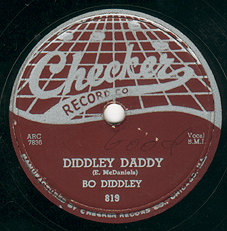Writing and recording
The song was recorded on May 15, 1955, in Chicago. Originally called "Diddy Diddy Dum Dum", [5] it started out as a Billy Boy Arnold composition, which Leonard Chess, owner of Chess Records (Checkers was a subsidiary label of Chess), had heard Arnold play and wanted Diddley to record. However, Arnold had just signed a contract with Vee-Jay Records, and had recorded the song the day before at Universal Recording Corporation. When Chess wanted Arnold to sing the song, the latter realized he had a contract, responding, "I can't do it...I just recorded it for Vee-Jay." Chess responded, "Goddam! Ain't this a bitch!" A solution, however, was found on the spot: Diddley and Harvey Fuqua, who happened to be around, rewrote the lyrics. [6]
As it happened, the harmonica player Little Walter was in the studio, and he asked Billy Boy Arnold for his harp; Walter plays the long solo after the first verse (Arnold plays harmonica on the B-side, "She's Fine, She's Mine"). Also decided at "the spur of the moment" was to have Chicago doo-wop group The Moonglows sing background vocals. [6]
Critical praise
One of Bo Diddley's signature songs, "Diddley Daddy" evidenced Diddley's maturation process as an artist. [7] It was described as a "terrific nugget" [8] and an "infectious" "upbeat rocker". [9] The Chicago Sun-Times said it combined "outrageous braggadocio with a beat that resounds like an endless sexual shudder." [10]
Marking Diddley's popularity in England, the Rolling Stones, who early in their career often played Diddley songs live, [11] covered the song (along with Diddley's "Road Runner") on their first demo, recorded on March 11, 1963. [12] [13] Brian Jones would later borrow Diddley's guitar figure from the song for the band's 1965 single "19th Nervous Breakdown".
This page is based on this
Wikipedia article Text is available under the
CC BY-SA 4.0 license; additional terms may apply.
Images, videos and audio are available under their respective licenses.
